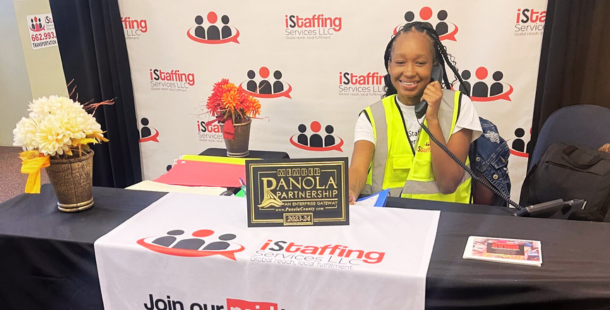Back

Blog
What’s Anne-Marie’s Why? Family
ICCC Alumna Offers Renewed Hope to Families in Mississippi
By ICIC | July 17, 2024
Batesville, a charming town in northern Mississippi, boasts a rich history as the oldest surviving settlement in the state. Home to nearly 8,000 people, Batesville offers a life of tranquility amidst the countryside. Its residents are mindful that the Mississippi State Penitentiary at Parchman lies just 50 miles away. While most days, this fact remains inconsequential, there are times when individuals who have completed their sentences return to Batesville to start anew.

This transition is no easy feat. Often, reintegration into society following incarceration is hindered by prevailing public sentiments and policies. Acquiring basic needs such as housing and employment become daunting challenges. Many landlords are reluctant to rent to formerly incarcerated individuals, and laws render them ineligible for public assistance benefits, including those related to housing. Similarly, employers are hesitant to hire returning citizens. According to a 2018 study, the unemployment rate among formerly incarcerated individuals exceeds 27%, surpassing any historical national rate. Despite these grim statistics, hope remains. Bryan Stevenson, an attorney and advocate for those currently and formerly incarcerated, said “Each of us is more than the worst thing we’ve ever done.” The best chance at a normal life is finding people who understand this. People who are willing to help. People like Anne-Marie Jenkins.
Jenkins is a New Zealand transplant whose compassionate spirit and natural skills as a networker and problem solver landed her in the staffing industry. She spent 14 years in outreach and admissions with the Job Corps program, supporting students between the ages of 16 and 24 with completing their high school diploma or GED and gaining the skills to obtain a job. It was the combination of her experience at staffing agencies and time with students from her work with Job Corps that led to the creation of iStaffing Services, a minority-owned company providing staffing solutions, HR services, and employee transportation throughout the North Mississippi region.
Breaking Barriers and Driving Change

Living in Mississippi was not by happenstance for Jenkins. Her husband’s family is from the area and when his aging parents needed care the couple and their three children settled there to help. Jenkins explains that the decision to move was easy because “Family is my why.” It was in Batesville that Jenkins discovered the unique challenges that Job Corps students were facing as they graduated from the program and sought employment. First, opportunities in the area usually offered minimal pay, between $7 and $8 an hour. Additionally, students were often unaware of resources available to them and those who were formerly incarcerated often had no means of getting past employer bias. But the largest barrier that most of these students could not overcome was the lack of adequate transportation. With no ride share services or taxis in their area of the Delta, it was up to each individual to have transportation to get to and from work.
Seeing these challenges and knowing that she had the experience and network to make a difference, Jenkins didn’t hesitate to help when her students asked for assistance. She believed that she could find anyone a job and transportation, as long as they had a phone, regardless of their location, even in the most remote areas. So, she went to work. She saved up $1500 and used it to purchase a 15-passenger van from a church. She then collaborated with contacts at the Department of Corrections and secured a contract with a food factory 50 minutes away from town, offering an hourly wage of $16, double the earnings that were available in town. Then she spread the word, inviting those who needed jobs to meet at the Boys and Girls Club, directly across the street from the Job Corps office. The van carried justice-impacted individuals and anyone else looking for work to their jobs at the factory. Soon, a regular route was established, with the van stopping at gas stations from Batesville to Horn Lake to pick up and drop off employees for their shifts.
Jenkins’ model of bridging quality employees with transportation and hiring employers worked so well that she was able to purchase six additional vans and a 32-passenger bus to support business demands. Yet, as with every business, there have been years of growth and years of challenge.
Turning Adversity into Triumph through ICCC
In 2023, Jenkins took a chance at earning a new client, applying to become the staffing agency for FedEx in Memphis, Tennessee. She did not receive a contract at that time, but she got something even more valuable. One of the FedEx team members saw the benefit of Jenkins’ company to the community and nominated her for ICIC’s Inner City Capital Connections (ICCC) program. ICCC is a tuition-free, comprehensive, 40-hour “mini-MBA” program specifically designed to empower entrepreneurs in under-resourced communities by providing them with advanced education, actionable insights, networking, and personalized coaching. A long-time partner of ICIC, FedEx has been instrumental in bringing the program to Memphis, acting as the lead sponsor for seven of the eight cohorts held in the city. Memphis alumni have seen great success after completing ICCC, averaging a 231% revenue growth and $17M in capital raised across all cohorts.
“Our business is open today because of ICCC.”
– Anne-Marie Jenkins, iStaffing Services
The program nomination came during a difficult time for the Jenkins family. The care needs for her in-laws increased, requiring them to move into her home. Shortly after the move, her father-in-law passed away. Even though it was hard, participating in the program was exactly what she needed. Jenkins expressed, “The one thing that kept this business going while we went through that challenging time was the webinars. They were just amazing! I would put on my headphones, get on the webinar, and forget everything else for that one hour.”
At the events, Jenkins gained valuable insights from experienced business owners who had successfully navigated the same challenges she was facing. Engaging in the Q&A sessions allowed her to receive real-time answers to her pressing questions. Overall, she found the webinars to be a source of empowerment and a confidence builder as she no longer felt isolated in her struggles or as though she was the only one making mistakes.
FedEx has been instrumental in bringing the program to Memphis, resulting in an average of 231% revenue growth and $17M in capital raised across eight cohorts.
Now a graduate of the program, Jenkins is beyond grateful for her experience and continues to lean into ICCC’s network. Knowing that the business was in dire need of assistance, she reached out to Marnell Love, a Management Consultant for Communities Unlimited, one of the resources from the program. He has mentored her for the last few months, developing a strategy to bring the business out of the red. With his guidance, iStaffing saw a nearly 400% increase in their net income in less than 30 days. Jenkins states, “Our business is open today because of ICCC. We were in the red and could not get a loan to keep going. Through ICCC’s network, I was connected to Marnell Love at Communities Unlimited. His mentorship put us in the black in just one month.”
Love is also helping her to attain a loan, which she was unable to do before the program. By following the strategy that he’s laid out, the company expects to see a minimum of 600% increase in their profits this year.
From Caregiving to Community Catalyst

Jenkins relocated to Mississippi to care for her aging in-laws and discovered that her passion for family extends beyond her relatives. As the sole staffing agency offering transportation for workers, iStaffing Services has become a source of hope and a catalyst for positive change for families across her community. In the past year alone, the company has successfully placed 300 individuals in jobs, enabling them to support themselves, their families, and their communities. While financial stability is important for everyone, it holds particular significance for those who have previously been incarcerated. Gainful employment lays the foundation for a normal life, fostering healthy family and community connections. In a society often skeptical of reintegration, Jenkins isn’t just creating employment opportunities; she’s offering second chances. Through her involvement in the ICCC program, she has stabilized her business and looks forward to positively impacting many more families in the Mississippi Delta. Her advice to fellow business owners, or anyone seeking success, is “Never give up. Push through challenges. You have the strength and capability to succeed.”
About ICCC
Inner City Capital Connections (ICCC) is a tuition-free executive leadership training program designed by ICIC to help business owners in under-resourced communities build capacity for sustainable growth in revenue, profitability, and employment. ICCC is uniquely designed to provide three critical elements for sustainable growth: capacity-building education, one-on-one coaching, and connections to capital and capital providers. ICCC annually hosts in-person and virtual cohorts across the U.S. and Canada. To learn more and apply visit icic.org/iccc
